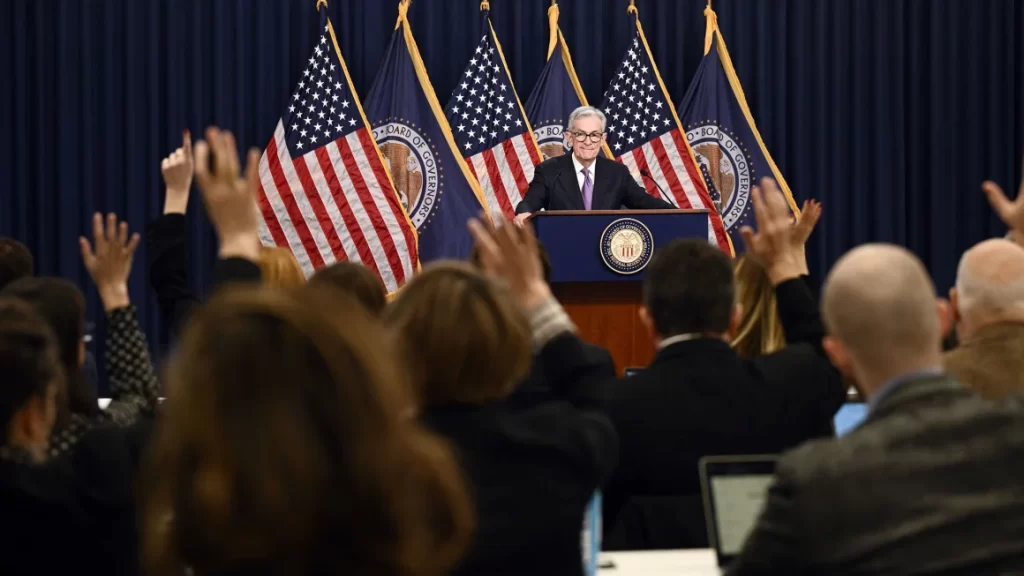The Federal Reserve makes its first interest rate decision of the year on Wednesday. But with practically all of Wall Street in agreement that no changes will be made, investors are focused on Fed Chair Jerome Powell’s afternoon press conference where he’ll answer questions about his outlook for monetary policy.
And if past performance is any indicator of future results, there’s a lot resting on Powell’s guidance. We can guess what might happen: If he hints that cuts are coming, markets will likely respond with glee. If he suggests that interest rates will stay higher for longer, we can expect stocks to sink.
But analysts say that Powell isn’t as influential as we’ve been led to believe. Researchers at Bespoke Investment Group mapped the performance of the S&P 500 index against the probability of a rate cut at the March meeting and found the two aren’t very correlated.
The odds that the central bank cuts rates in March, based on federal funds futures, have halved since late December. But over that same period, the S&P 500 has risen by more than 3.5%. That might be because inflation rates are once again approaching the Fed’s target of 2%.
“Once inflation gets down below 5%, it disappears from the headlines,” Johns Hopkins economist and central bank scholar Laurence Ball previously told Before the Bell. “People go back to worrying about budget deficits or climate change or other public issues there are.”
The Personal Consumption Expenditures price index — the inflation gauge that the Fed uses as its target rate — was up 2.6% annually in December, closing out 2023 with a far softer punch than the 5.4% gain a year prior, according to Commerce Department data released Friday. December’s inflation reading was just 0.6 percentage points from the central bank’s goal of 2%.
At this point in the cycle, Fed decisions mean very little for the market’s trajectory, said Kevin Gordon, a strategist at Charles Schwab, in a note to investors on Tuesday.
Gordon tracked the market back to the early 1900s and found that on average, the S&P 500 went up by 2% in the periods between the Fed’s last rate hike and the first cut. However, that average doesn’t tell the full story because markets have swung wildly, between 27% lower and 26% higher, during those periods — ending higher only 50% of the time.
When inflation eases, investors turn their attention to other pressing matters. There are plenty of those right now: conflict in the Middle East and Europe, rising trade tensions between the US and China, and China’s slowing economy, for example.
But traders are also focused on the resilience of the US economy through all of it. Unemployment remains low, and US job openings grew in December. The US economy, as measured by gross domestic product, is stronger than expected, and consumers continue to spend.
“The Fed’s next decision should not be the centerpiece of anyone’s investing thesis,” said Gordon. There’s a lot to take in, and studying TV subtitles as Jay Powell speaks Wednesday might not be Wall Street’s best use of time.
Tensions around the Red Sea could lead inflation higher
The drone strike that killed three US service members and injured dozens in Jordan has increased fears on Wall Street of escalating war in the Middle East.
The Sunday attack was the first time American troops have been killed by enemy fire in the Middle East since the beginning of the Gaza war in October. Asked by CNN’s Arlette Saenz whether he has decided how to respond, US President Joe Biden said, “Yes,” but declined to provide further details.
Markets have so far mostly shrugged off worries about more fighting, but oil prices have edge up as Americans brace for the US response to the attacks. West Texas Intermediate, the US crude benchmark, gained $1.04, or 1.35% on Tuesday, settling at $77.82 a barrel. Brent, meanwhile, rose 47 cents, or 0.57%, and finished the day at $82.87.
Conflict in the Middle East and the Red Sea in particular “poses a risk to global trade,” said EY Senior Economist Lydia Boussour on Tuesday.
Many cargo ships are now avoiding the Suez Canal because of repeated attacks by Iran-backed Houthi rebels. That’s a huge blow to trade: As much as 15% of global trade and 25%-30% of global container shipments transit through the waterway.
That increases the chance of inflation pressure as shipping costs surge, a risk the International Monetary Fund also highlighted in its World Economic Outlook Tuesday.
“For now, we don’t expect the situation in the Red Sea to substantially alter the outlook for global inflation and global monetary policy this year,” said Boussour. “However, a prolonged conflict with shipping costs staying as high through 2024 could add up to 0.7 percentage points to global inflation this year.”
Microsoft profits climb 33% as AI business thrives
Microsoft recently became only the second company ever worth $3 trillion as the artificial intelligence boom sent shares of the company’s stock soaring.
On Tuesday afternoon, the company reported fourth quarter earnings that contained further fodder for bullish investors. Net profit for the final quarter of the year grew by 33%, the company reported, largely due to its investments in the artificial intelligence sector.
The company reported earnings per share of $2.93, beating Wall Street expectations of $2.79. Revenue was up 18% from last year at just over $62 billion.
“We’ve moved from talking about AI to applying AI at scale,” Microsoft CEO Satya Nadella said in a statement. “By infusing AI across every layer of our tech stack, we’re winning new customers and helping drive new benefits and productivity gains across every sector.” Shares are up about 10% so far this year. The stock slipped less than 1% in premarket trading Wednesday.
— CutC by cnn.com


